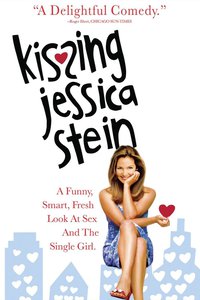Kissing Jessica Stein (2002)

Or, if you prefer, When Jessica Met Helen...
Comparisons with When Harry Met Sally (or Woody Allen) are unavoidable, I suppose, when you have a romantic comedy featuring a neurotic Jewish lead, classic big-band soundtrack, appealing New York locations and a plot about what happens after friends have sex.
Helen (Juergensen), bored with the three unfulfilling boyfriends she is currently stringing along, decides to place a personal ad looking for a woman “for friendship or more.” In amongst many scary replies, there’s a message from Jessica (Westfeldt, who’s like the whiny, less talented version of Lisa Kudrow), who’s sure she’s straight, but is intrigued by the literary quote in Helen’s ad.
After an uneasy first date, the pair hit it off, although the sex part doesn’t exactly flow easily at first. Which is where the title comes in, because kissing is as far as it goes for a while, mainly because of Jessica’s aversion to sex. There’s a particularly excruciating scene where Jessica produces all this research she has done on the subject, much to Helen’s embarrassment and bewilderment. But, as expected, they get beyond the kissing in the end.
Our twosome have ups and downs, and there’s a bittersweet ending which is happy, but not in the conventional sense of most rom-coms. Beyond the main casting twist, there’s not a great deal you haven’t seen before: Jessica has an initial parade of bad (male) dates; Jessica’s meddling mother (an engaging turn from Tovah Feldshuh, best known from TV’s Law and Order) tries to set her up, even at temple; Helen’s gay friends are entirely camp, colourful and amusing, but ultimately clichéd and superfluous.
Based on Westfeldt and Juergensen’s own play, Lipschtick, the writer-producer-leads have succeeded in their original intention of creating two strong, realistic female characters (well, three including Mrs Stein). They are certainly not afraid to make Helen and Jessica unsympathetic at times (or, in Jessica’s case, most of the time). There’s the occasional piece of nice dialogue, but the movie never really escapes from being an off-Broadway play. It remains talky when it doesn’t need to be, which is why the dialogue doesn’t ring true.
The film got a lot of publicity at its time of release and went on to be a sleeper hit. I’m guessing that this was mostly because of the novelty factor and also because the story behind the making of the movie—two out-of-work nobodies write a film for themselves, make good—is the sort of thing that plays well in the media.
It’s mildly different from your average join-the-dots rom-com in that it’s not boy-meets-girl but, when neither Feldshuh nor Juergensen are on screen, there is nothing at all to hold the attention.